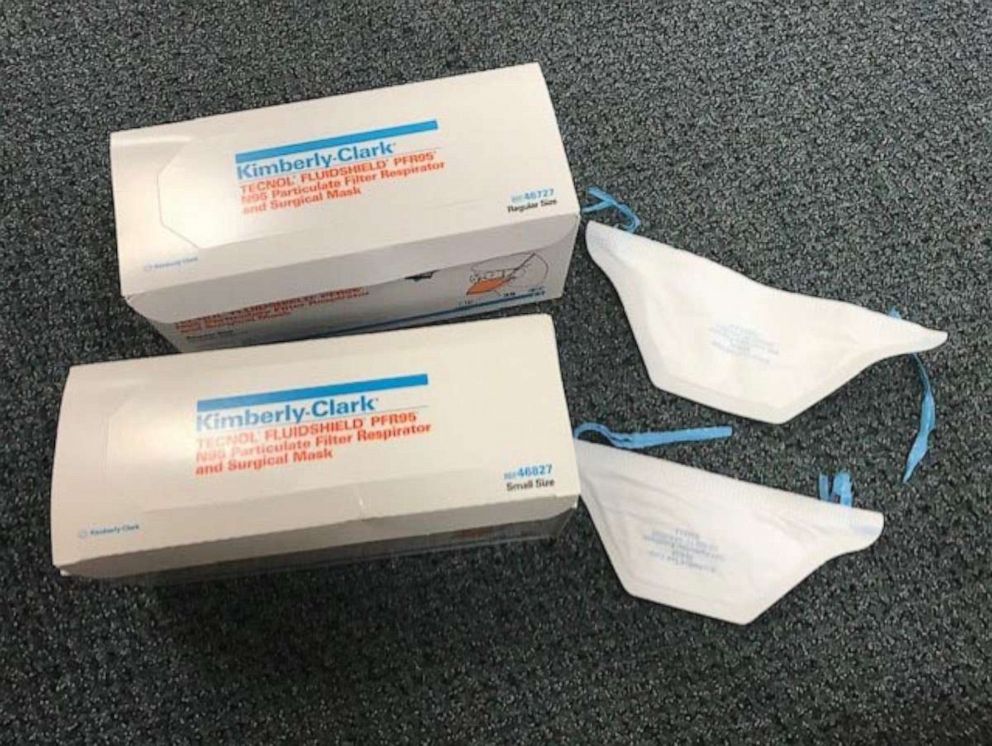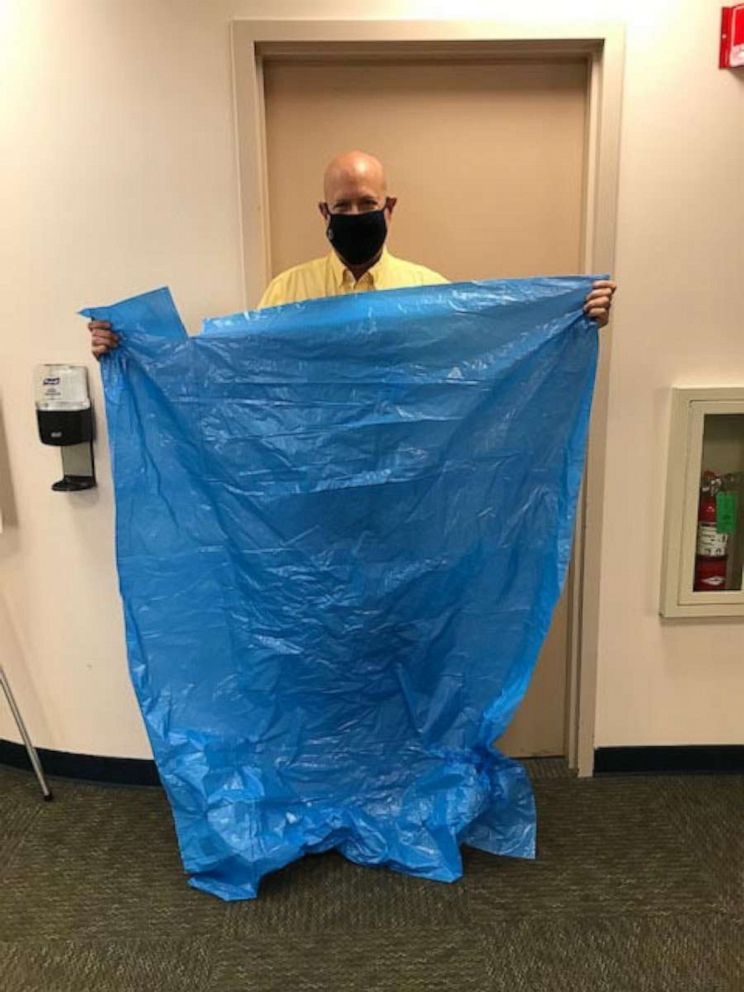Nursing homes got masks that 'probably should have never gone out': Official
FEMA official said some equipment "just slipped through the cracks."
Federal officials are trying to correct errors that resulted in shipments of outdated or impractical equipment to America’s hard-hit nursing homes in the midst of the coronavirus pandemic, according to an audio recording obtained by ABC News of a call between a top government official and advocates for those in nursing care.
Col. Brian Kuhn, the defense logistics official overseeing the shipments, acknowledged that some nursing homes received respirator masks that were “way expired” and "should have never gone out," according to the recording of a call with members of LeadingAge, an association of nonprofit providers of aging services that includes many nursing homes. The group also posted the audio of the call online.
"They just kinda carte blanche shipped them all out," said Kuhn, a representative from the Federal Emergency Management Agency (FEMA) on the White House Supply Chain Task Force. "It was one of those things, I’ll be honest, just slipped through the cracks and probably should have never gone out."
Kuhn's comments followed reports from several media organizations, including ABC News, that found that nursing homes had received shipments of protective gear from the federal government that did not meet health care standards, including some masks with brittle or snapped elastic straps, and other cloth masks that carried stickers on them that read: “Do not use with COVID patients.”
As the head of the coronavirus task force, Vice President Mike Pence plays a supervisory roll in the nursing home relief operation. LeadingAge has written twice to Pence to raise concerns about the shipments. A June 11 letter detailed more than a dozen complaints from nursing homes the organization had documented.
“On behalf of millions of older Americans who know that the coronavirus threat is not over, I implore you to investigate these reports seriously and thoroughly -- and take swift action to ensure they can trust the federal government to serve their interests,” wrote Katie Smith Sloan, the president and CEO of LeadingAge.
In ABC News’ previous report a Trump administration official said the criticism was overblown and that the number of complaints about equipment were small and often inflated as many facilities are receiving different types of equipment than they typically work with.
Pence’s office referred ABC News' questions for this report to FEMA.
A FEMA official told ABC News Monday that shipments of respirators and those containing cloth masks came from the federal Health and Human Services department, and were not part of the FEMA program to ship supplies to some 15,000 nursing homes around the country. According to FEMA, 14,965 shipments have gone out as of last week.

FEMA acknowledged it was responsible for synthetic gowns that have brought a number of complaints from nursing facilities, with staff reporting the protective drapes had no openings for head or arms.
"The term I used is embarrassingly unusable," said Dr. Noah Marco, the chief medical officer of Los Angeles Jewish Home, a non-profit organizations whose network includes includes four skilled nursing facilities. Marco told ABC News that the gowns resembled "dark blue plastic bags."
Jan Emswiler, nurse educator at Virginia Mennonite Retirement community, described gowns that are "nothing that we have ever seen before or ever used in this type of care."
"There’s no cuff," Emswiler said. "You have to make your own cuff in the end of the plastic sleeve. You either have to bust through it or cut through it."
In response to an inquiry from ABC News, FEMA said all supplies shipped by the agency have met standards outlined by the Association for the Advancement of Medical Instrumentation.
“We have met with Leading Age Association to discuss these shipments and address their concerns,” said Lizzie Litzow, the FEMA press secretary. “All [protective equipment] shipped by FEMA met [industry] certification and went through standard quality assurance processes before they were received by the nursing homes.”
Tune into ABC at 1 p.m. ET and ABC News Live at 4 p.m. ET every weekday for special coverage of the novel coronavirus with the full ABC News team, including the latest news, context and analysis.
The agency said it has asked the supplier to post an instructional video online explaining to nursing home staff how to use the gowns – a solution Marco said he found "highly insulting."
"I've been a physician for 30 years and for them to say that we’re complaining because we may not be familiar with equipment,” Marco said. "I think I’m pretty familiar with how to put on a gown or a mask."
Not all recipients were unhappy with the federal shipments, however. Donald R. Kirsch, the administrator at the Good Shepherd Nursing Home in West Virginia, said his facility received high quality surgical masks, gloves and gowns.
“I want ABC News to know how much our residents and I appreciate the Trump Administration and FEMA for doing all they can for us,” Kirsch said.
Toby Edelman, a senior policy attorney with the Center for Medicare Advocacy, said nursing homes bear some responsibility for making sure they have enough usable equipment in the midst of the pandemic.
“But if FEMA says they are sending [protective equipment], they should be sending equipment that is useful,” Edelman said. “They need to send equipment that is functional and usable immediately.”

During his conference call with nursing home advocates, Kuhn apologized for the confusion and said the agency has “gone with a different gown” for the second wave of FEMA shipments, which are scheduled to start in coming days and continue through August.
As for the problem masks, FEMA has told ABC News that they did not ship any respirators from the national stockpile and instead pointed at the Department of Health and Human Services as the possible supplier.
According to Marco, the dusty N-95 masks received by his facility in Los Angeles arrived in an unmarked box.
HHS has been shipping cloth masks to nursing facilities, and a spokesperson told ABC News last week that those masks were shipped by the agency in order to provide extra protection for future visitors and vendors and were not meant to be used as personal protective equipment, or PPE.
HHS did not immediately respond to request for comment Monday regarding the respirators.
For months, nursing homes have sounded alarms about their lack of access to protective equipment as their residents have proven to be some of the most vulnerable to COVID-19.
The Centers for Medicare and Medicaid, the federal agency responsible for oversight of nursing homes, currently reports that over 31,000 nursing home residents have died as a result of COVID-19. An ABC News count of state-by-state data indicates the number is higher likely because the federal count started well into the outbreak and did not include some types of long-term senior care facilities. In a mid-May survey, ABC News found 36,000 nursing home deaths.
Trece Andrews is part of the laundry staff at a nursing home facility in St. Clair Shores, Michigan that she says still has positive COVID-19 cases. She noted that the labor union SEIU, for which she serves as a steward, found in a national survey that 46% of nursing care workers still lack sufficient protective gear.
“Absolutely [there] is a need for [personal protective equipment] in the nursing homes,” Andrews said. “We're recycling masks, some people didn't have gowns for us to wear in the appropriate rooms, people wearing garbage bags at times still. And the hand sanitizer's limited.”
What to know about coronavirus:
- How it started and how to protect yourself: Coronavirus explained
- What to do if you have symptoms: Coronavirus symptoms
- Tracking the spread in the U.S. and worldwide: Coronavirus map




